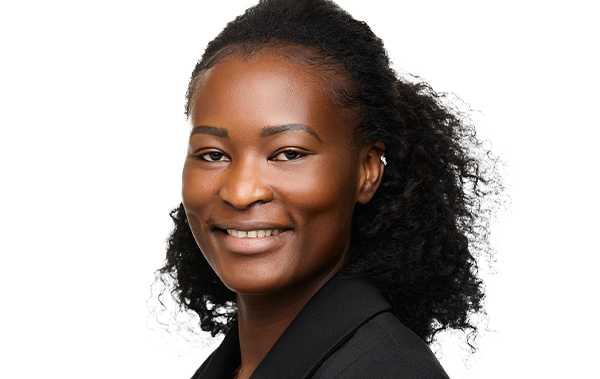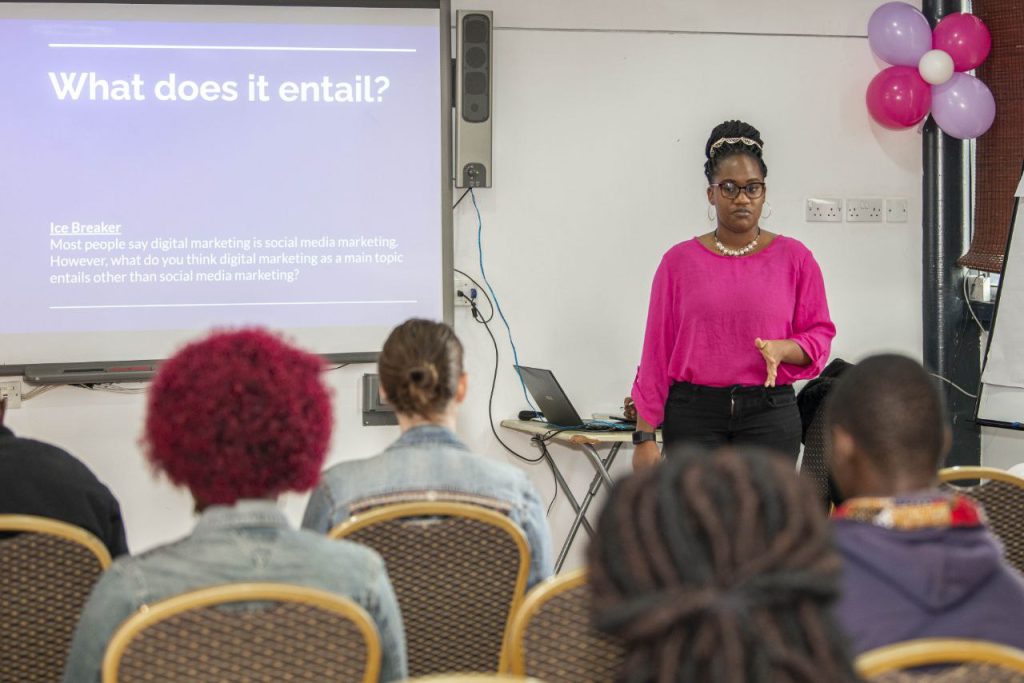Entrepreneur Naom Monari, 32, was working as a nurse when she realised something was missing in Kenya’s healthcare system, and she knew she had to do something about it. In 2017, with the support of the Futuremakers Women in Tech programme, she founded Bena Care, a digital platform connecting nurses and physiotherapists who treat patients with life-limiting illnesses in the comfort of their own homes.
Her enterprise has since expanded across Kenya, and, together with her team, she has served over 25,000 patients (600 patients a month).
“When my first patient, a post-stroke gentleman with hypertension and diabetes, was visibly tired and homesick while admitted at a health facility, and his son could not make frequent hospital visits because of his job, Bena Care became a lifesaver. We tended to him at home. I am proud to say that Bena Care is the first mobile dialysis unit powered by research and innovation serving patients with kidney diseases in rural, hard-to-reach areas in Kenya,” Monari told University World News.

Naom Monari, Image: Echoing Green
Tackling the gender gap in tech
The Futuremakers by Standard Chartered initiative supports women-run start-ups with business management training, mentoring and seed funding across various markets and fields.
The Eighth Standard Chartered Women in Tech (WiT) Accelerator Programme continues to cement its place as one of Kenya’s leading platforms for women-led innovation.
The initiative, launched in 2017 through a strategic partnership with Standard Chartered, @iBizAfrica – Strathmore University, and Village Capital, is designed to tackle the gender gap in the tech ecosystem by empowering early-stage, women-led startups with tailored support, mentorship and seed financing.
The 2025 cohort was officially launched on 29 April at the Standard Chartered Kenya headquarters under the theme ‘Innovate, lead, inspire’. The programme continues to offer participants access to immersive training, expert coaching, and up to US$10,000 in seed funding, while also building valuable business-to-business links.
Since its inception in 2017, the Women in Tech Programme has awarded over KES143 million (US$1.1 million) to 39 ventures. To ensure innovation truly serves all Kenyans, Cohort 8 will prioritise solutions tailored to under-served communities and local needs, such as USSD [Unstructured Supplementary Service Data] platforms, offline apps and community-based tech models.
At the recent launch, Dr Vincent Ogutu, vice-chancellor of Strathmore University, said: “True innovation is not measured by investment alone, but by inclusion. When we empower women at the margins to lead with tech, we reimagine what progress looks like for everyone.”
Tools, mentors, and tech guidance
The WiT Accelerator targets early-stage start-ups, tackling real-world challenges through technology. Over seven cohorts, it has received 2,250 applications, supported 80 startups, and disbursed US$390,000 in seed funding to 39 women-led businesses.
At the heart of the initiative is Strathmore University’s commitment to grounding entrepreneurship in research, learning, and local context. Through its innovation hubs – @iBizAfrica and @iLabAfrica – the university delivers the programme’s intensive masterclasses and incubation, guiding startups from early concept to scalable enterprise.
“We provide entrepreneurs with research-backed tools, mentorship, and technical guidance that ground innovation in practical impact. This programme is about scaling businesses that solve real-world problems, especially in areas where digital access is a luxury,” said Dr Joseph Sevilla, director of @iLabAfrica, emphasising the role of academic-industry partnerships in building tech ecosystems.
From digital investment platforms to dairy logistics, alumni of the WiT programme are tackling a wide range of challenges.
Trained to compete
Melanie Hapisu-Wambugu, a Strathmore University alumna and a successful participant from Cohort 5, is the founder of DigiPath Africa, a digital marketing agency that helps brands generate leads and boost conversions through services such as digital audits, paid advertising, content creation, landing page design, and training.
“Small and medium enterprises lack affordable and culturally relevant digital tools to market themselves and many professionals lack practical, Africa-centric training to compete in the digital economy, a gap I saw and ran with,” Wambugu told University World News.
She has overcome challenges like building trust in already saturated markets, trained over 600 professionals in digital marketing, collaborated with various brands to increase online engagement, and even won a 2023 Great Companies Global award after securing funding from the WiT programme.

Melanie Hapisu-Wambugu presenting on Digital Marketing during a session
Ndovu, a digital investment platform offering a curated local and global funds tool that helps users save toward goals, buy fractional shares, and access Shariah-compliant options (financial services, investments, or products that adhere to Islamic law), all backed by blockchain security, is also an example of standout alumni.
Stringent selection, incubation
Rhea Soil Health is helping farmers take the guesswork out of soil care in agriculture. Through IoT [Internet of Things] sensors and laboratory analysis, Rhea delivers real-time insights into soil nutrients and pathogens, enabling precision farming and sustainable practices.
Meanwhile, Gwiji for Women uses technology to connect casual cleaners with paying clients. Known locally as ‘Mama Fua’, these women are often excluded from formal job markets. Gwiji links them to work and offers digital literacy and professional training, creating pathways to dignified, tech-enabled employment.
The programme is structured around a competitive application process, where 10-15 startups are selected each year. They undergo a three-month incubation period featuring tailored entrepreneurial training, mentorship from industry experts, and multiple progress reviews. The final pitch event determines which seven startups receive US$10,000 each in seed financing.
The WiT programme aims to deepen its support for alumni through peer-to-peer engagement, new industry partnerships, and expanded access to regional markets and investors.
With each cohort, the accelerator is doing more than funding innovation. It is strengthening Kenya’s tech ecosystem by positioning the university as a launchpad for impact-driven, women-led enterprises.
Solving real problems in communities
Cohort 8 is a deliberate intervention to ensure women-led businesses survive and lead in the digital era. By supporting affordable, adaptive technologies, whether through USSD, SMS, or offline platforms, WiT is investing in solutions that can reach every corner of society, not just the connected few.
Wambugu challenged young African innovators and changemakers to start now, citing progress beating perfection and the need to solve real problems in communities using innovation.
“Choose collaboration over competition, as some of our greatest wins have come through partnerships. Stay curious, resilient, and always client-focused. Remember, your resilience is Africa’s greatest tech stack – code it boldly,” she challenged young changemakers.
